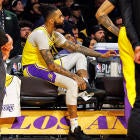The 2019 offseason was the summer of tampering in professional basketball. The illegal practice long committed under the radar became one of the most discussed topics of a wild NBA offseason. Whether it was Kawhi Leonard's role in convincing Paul George to ask for a trade, the relationship between LeBron James, Anthony Davis and Klutch Sports or even the reporting of new contracts only minutes after the legal opening of free agency, almost every major move of this offseason included some cries of tampering from angered fans and teams.
Well, commissioner Adam Silver and the NBA's Board of Governors decided to do something about it, as on Friday the league unanimously passed a stricter package of measures to enforce compliance with tampering and salary cap circumvention, according to ESPN's Adrian Wojnarowski.
Under the new changes, a selected team ops member from each organization will have to verify that their respective team did everything by the book when it comes to free-agent signings each year. Additionally, NBA owners must personally certify that every contract complies with all established rules. The hope is that this eliminates player-to-player, as well as team tampering. Teams will also be required to report, within 24 hours, of a player/agent soliciting unauthorized benefits or contact regarding contract matters. The league plans to randomly audit five teams each year to ensure that no rules were broken.
"Suspending executives...taking away draft picks....voiding contracts...All those provisions are on the table," Silver said of the new rule changes. "The ultimate goal is compliance."
Under the rules, fines for tampering with team or player personnel will double -- from $5 million to $10 million -- while the fines for unauthorized agreements will jump up to $6 million for a team and $250,000 for a player.
The changes don't come as a surprise, as figuring out a way to curb tampering has been a priority of NBA commissioner Adam Silver, as he feels that such acts could hurt the league's appearance of integrity.
"I think the consensus at both our committee meetings and the board meeting was that we need to revisit and reset those rules, that some of the rules we have in place may not make sense," Silver said in July. "I think that's what we discussed. I think it's pointless at the end of the day to have rules that we can't enforce. I think it hurts the perception of integrity around the league if people say, 'Well, you have that rule and it's obvious that teams aren't fully complying, so why do you have it?'
"I think the sense in the room was we should revisit those rules, think about what does make sense for our teams so that ultimately we can create a level playing field among the teams and that the partner teams have confidence that their competitors are adhering to the same set of rules they are."
The league made a couple of other tweaks to existing rules as well, including altering the language used in the rule book that governs traveling violations. Also, teams will now be required to submit their starting lineups 30 minutes before tip time, barring injury exceptions, instead of 10 minutes prior to tip-off.






















